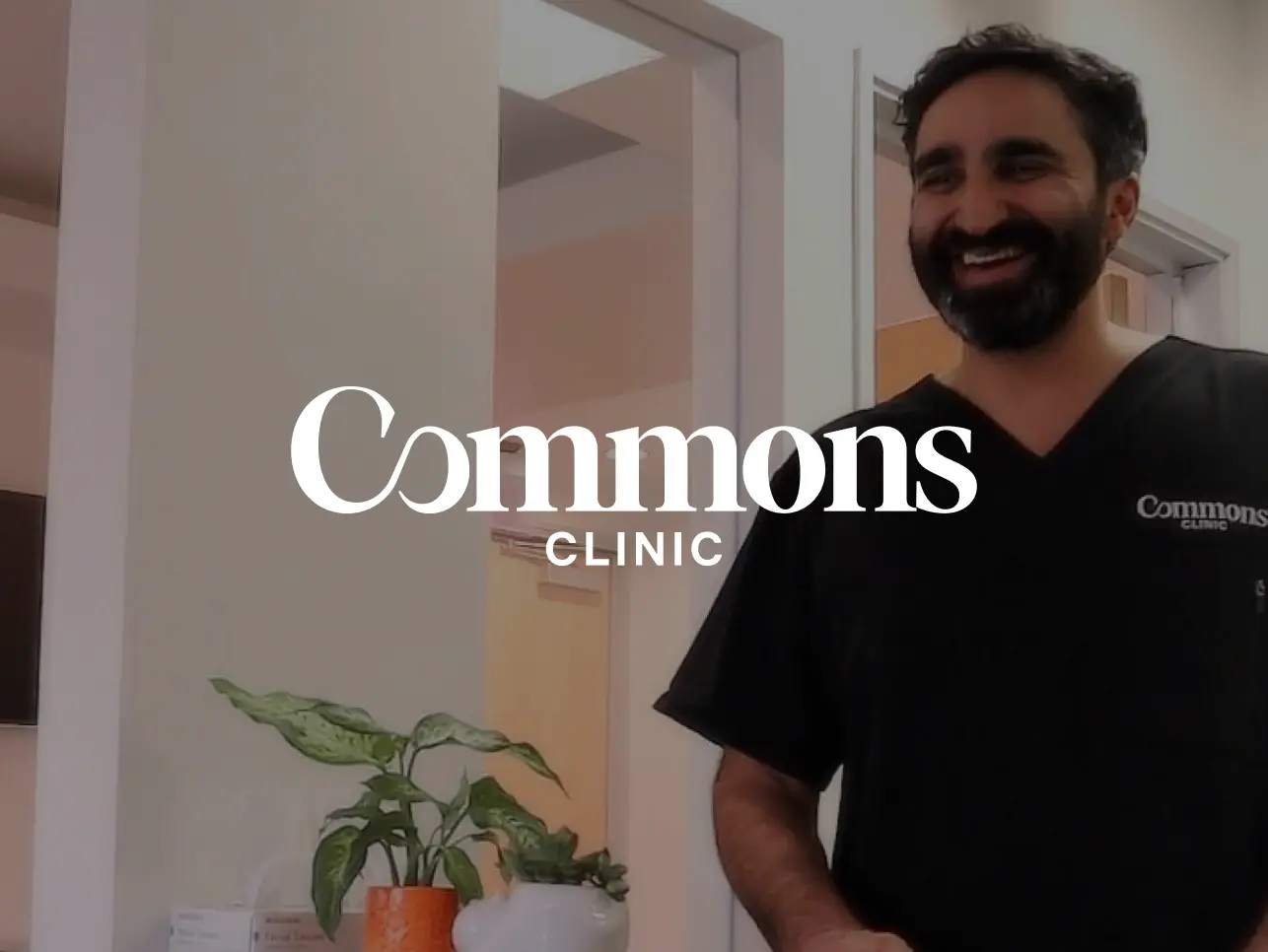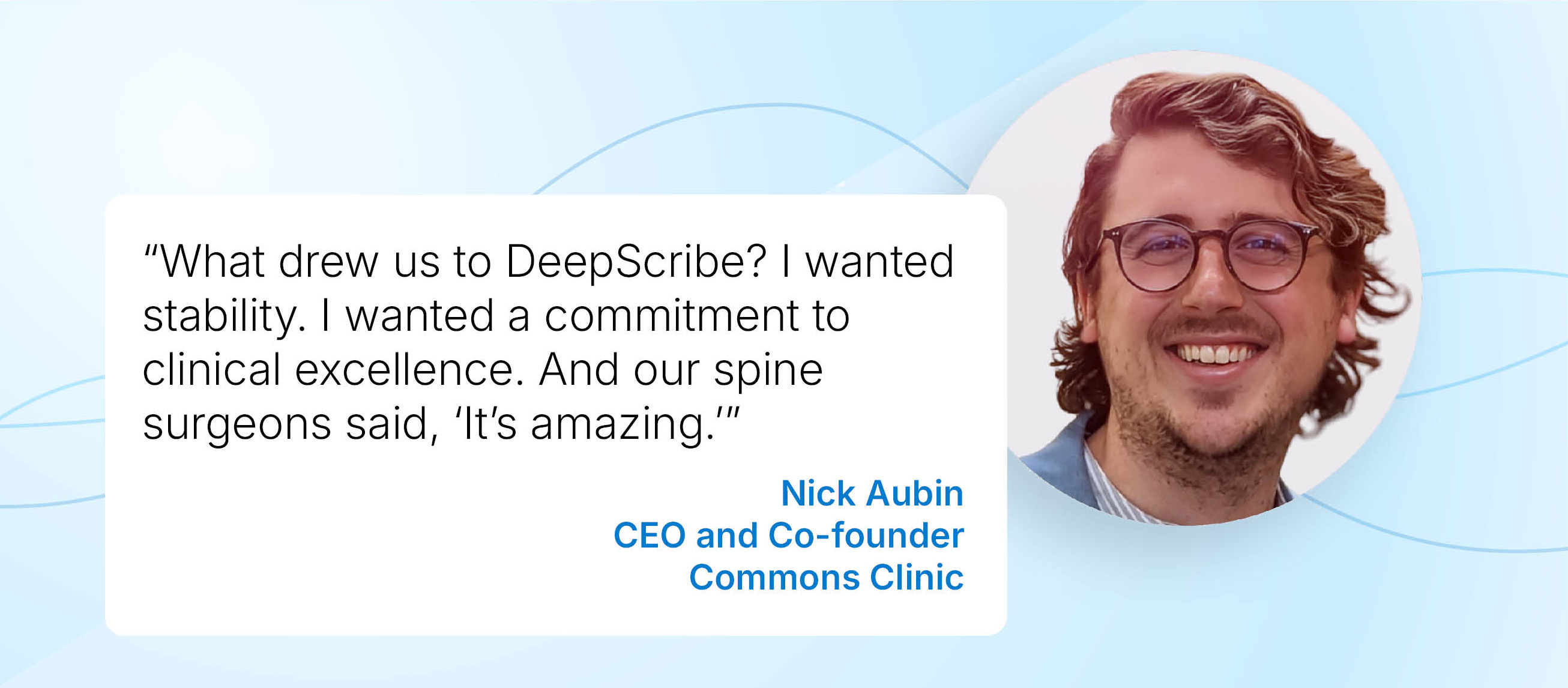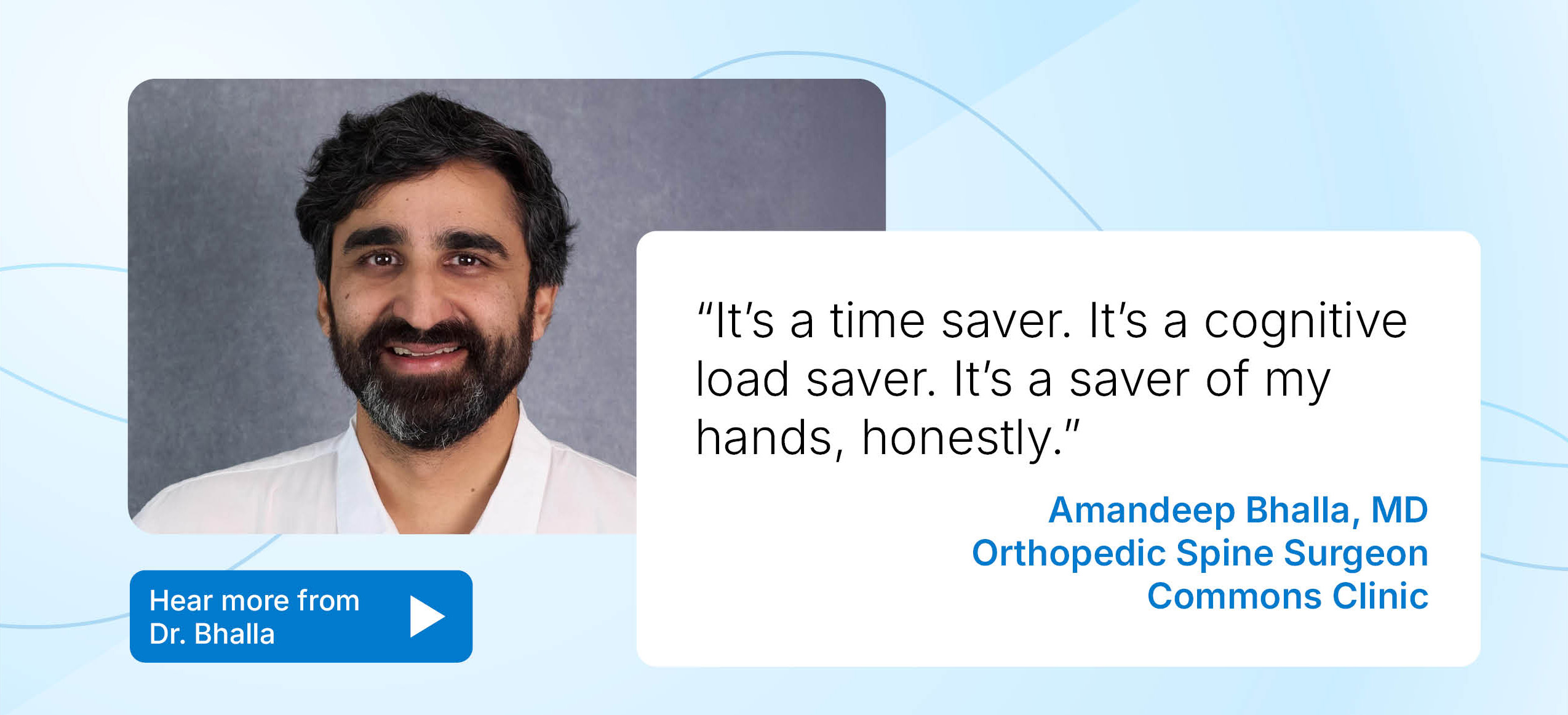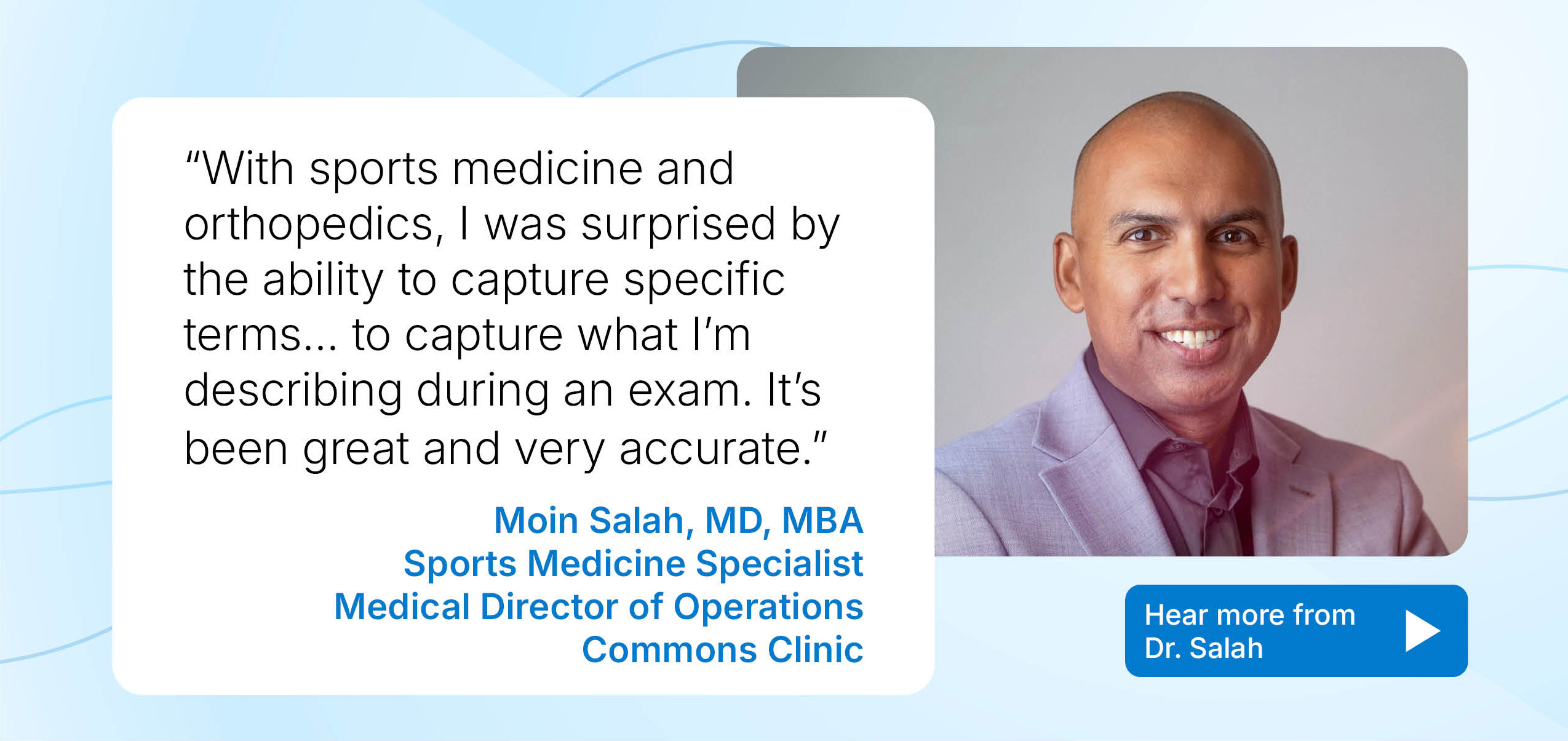Commons Clinic Embraces DeepScribe AI for Personalized Patient Care
Commons Clinic elevates patient experience by using DeepScribe AI, enabling doctors to focus on personal connection rather than documentation.


A Comprehensive One-Stop Shop for Orthopedic Patients
The U.S. healthcare system is generally seen as disjointed and disconnected, especially within musculoskeletal care. Navigating the path from consult to surgery to therapy (and beyond) can be treacherous. But for the past two-plus years, Commons Clinic has offered a solution: one organization managing an entire connection of care needs.
“The typical experience for someone with pain is an assembly line of care that passes you through a hospital, through imaging, through physical therapy,” says Nick Aubin, CEO and Co-founder of Commons Clinic. “We’re a one-stop shop where we are accountable for solving that pain.”
Aubin and team call it “expert care from start to finish”, with MSK specialists across areas including sports medicine, spine treatment, interventional pain management, and physical therapy. It’s an extremely collaborative approach that gets the patient what they need. “It bundles things together for patients in a way that’s high quality and simpler to understand,” says Aubin.
Caring for Those Who Care for Patients
When you know the Commons Clinic approach to delivering great orthopedic care, it’s clear why they chose DeepScribe ambient AI for their clinical teams.
“You can’t build a better product for patients without first building a better product for physicians,” says Aubin. For Commons Clinic, that means giving doctors what it takes to really thrive, including beautiful clinics, a top-flight surgery center, and the right technology solutions.
The Challenge: Delivering Patient Experience Excellence
Ambient AI scribing was toward the top of Commons Clinic’s list of technology must-haves.
“In the exam room, I was frequently looking from the patient to my laptop, making sure I jotted down important tidbits and notes,” recalls Moin Salah, MD, MBA, a sports medicine specialist and Medical Director of Operations at Commons Clinic. “I was missing out on a lot of nonverbal communication, the eye-to-eye contact... it was detracting from being able to develop a trusting type of relationship with the patient.”
“We’d be focused on the chart while speaking with the patient and trying to establish rapport,” says Amandeep Bhalla, MD, a renowned orthopedic spine surgeon with Commons Clinic. “We were really juggling so much.”
The Solution: DeepScribe Ambient AI for Orthopedic Care
Nick Aubin had already been impressed with ambient AI technology while seeking the best option for Commons Clinic. Learning about DeepScribe made his choice clear.
“We probably looked at every version of ambient AI,” says Aubin. “What really drew us to DeepScribe? I wanted stability. I wanted a commitment to clinical excellence. And our spine surgeons saw how DeepScribe worked at the State of Spine Surgery conference, and said ‘You’ve gotta see DeepScribe, it’s amazing.’”

Aubin also appreciated the value of DeepScribe’s direct EHR integration - but was most impressed with the concerted focus on specialists.
“DeepScribe has a familiarity with, and investment in, specialty care,” continues Aubin. “A lot of folks just go with something hospital-based or high volume, but that’s less understanding of our needs as specialists. DeepScribe is just different.”
Results: Greater Empathy, Better Notes, Happier Hands
With DeepScribe in the exam room, Commons Clinic physicians are refocused on a crucial element of orthopedic care: listening.
“To actively listen, to be empathetic, to come up with a collaborative game plan with the patient – it really helps you move forward,” says Dr. Salah.
“Using DeepScribe and ambient AI has really been liberating,” says Dr. Bhalla. “I’m able to maintain eye contact more, and really engage and develop a personal rapport much more because I’m not turned and trying to type into a computer at the same time.”

For these orthopedists, implementing DeepScribe has value even beyond the newfound connections made with patients.
“It’s a time saver. It’s a cognitive load saver,” shares Dr. Bhalla. “It’s a saver of my hands, honestly. As a surgeon, I value resting them as opposed to just hammering away at a keyboard all day.”
As orthopedists have experienced better quality of life in their day-to-day work, frequent use of DeepScribe across Commons Clinic has leapt quickly. In the three months following the initial rollout, the number of encounters documented by DeepScribe has more than doubled, and continues to grow.
Benefits of Bringing DeepScribe to Commons Clinic
Enhanced Patient Interaction
“When I walk into a room, I’m immediately able to hone in on the patient and start listening. It is incredibly refreshing,” says Dr. Bhalla, reflecting on the importance of an MSK patient’s story, told in their own words.
Time Savings
In addition to spending less time on documentation overall, the clinicians get some needed space in between visits. From Dr. Salah: “I’ve got a much more thorough note than I would have otherwise, and I’m able to focus on the next patient, giving them the time they deserve.”
Quality Orthopedic-specific Notes
DeepScribe’s custom AI for orthopedics understands the workflow and details of MSK care, and translates patient anecdotes into high-value clinical notes automatically. Customized sections include imaging, social history, and surgical history.

Partnering to Support A Transformation in Orthopedic Care
As Commons Clinic aims to restructure how patients receive care, DeepScribe has become a daily partner to help deliver that care, continuously evolving and improving ambient intelligence for specialists - complementing the longer-term goal for Commons Clinic.
“Our true ambition is to build a new, modern, value-based, tech-enabled organization,” says Nick Aubin, “looking at all the Mount Rushmore specialties where the value equation is out of whack. To be the next great specialty care institution.”
All that starts by making sure every clinician at Commons Clinic is properly equipped to deliver optimal care - and DeepScribe AI documentation is playing an essential part.
“Our physicians did not physically train their hands to type with, right? Very different muscles than holding a scalpel,” says Aubin. “We’re enabling this new interaction paradigm to do more stuff that’s valuable for our physicians and our patients - to deliver a higher quality experience and better outcomes.”
text
Related Stories
Realize the full potential of Healthcare AI with DeepScribe
Explore how DeepScribe’s customizable ambient AI platform can help you save time, improve patient care, and maximize revenue.




